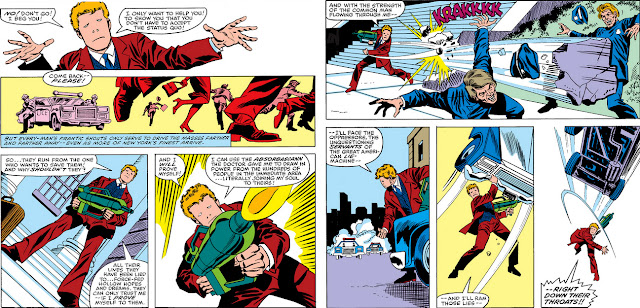(You can be sure those covering the scene aren't likely to forget him.)
A creation of writer J.M. DeMatteis and artist Mike Zeck, we first met Everyman in his PPC profile that saw him going up against Captain America in 1982--on a mission to avenge those like his deceased father whom he felt had suffered for the false promises of the American dream. Consequently, Everyman's enemy became the man who best epitomized that dream.
We can see that Everyman bears little similarity to writer Tony Isabella's "everyman," Stuart Clarke, aka Rampage, a character who limited his own wrath to government policies which led to the 1973-75 recession. What the two men do share is a hatred for their circumstances that caused their respective losses--but while Rampage feels he's justified in stealing from F.D.I.C. banks to revive his bankrupt company, Everyman lashes out at the man who in his mind deserves every bit of his rage.
When Everyman reneges on his promise to free his hostage, Cap settles his hash, and Everyman is subsequently sent to a mental institution to treat his unhinged mind. A year and a half later, DeMatteis revisits the character in a two-issue story in Marvel Team-Up, where our former Everyman, Larry Ekler, looks up a "relative" whom you may recognize, a man who quickly realizes that Larry may have fabricated the reason for his newfound freedom.
It's quite a backstory that DeMatteis provides for the Eklers, though one gets the feeling that it doesn't paint Reed in the best light despite his regret over losing touch with a man he considered one of his best friends as well as the young man who regarded him as his uncle. That said, it's a realistic portrayal of school friends whose lives digress to such a degree that one may grow uncomfortable with keeping in touch.
Subsequently, Larry heads for the street to, as before, rally support from those who also feel as if their country has failed them. In doing so, we get a sense that his doctor at the mental institute may have had a hand in not only his unwarranted release, but his destination, as well.
That's our cue to visit said institute, where we learn the identity of said doctor--a man who's had his hand in a number of deceptions over the years involving, in particular, Captain America, though it appears that his targeting Reed Richards is more of a matter of practicality in terms of employment opportunity.
As we've learned, Spider-Man has come to Reed's aid following Larry's attack, and, following another encounter with Larry which forces him to realize the danger he is to innocent lives and flee, they move against Doctor Faustus at the institute where he has planned well for making Reed crack under pressure. But when Reed finally sees through the lies, it's Faustus who must face up to the truth--of his defeat, as well as his pitiful status in the eyes of the scornful woman named Anna. For it appears Faustus has also been deceiving himself.
Needless to say, Anna Fennhoff made the list of women who exercised a measure of control over men in power. (Though in this case, empowered by Faustus himself.)












5 comments:
I never saw these issues, but I gotta say, the cover on #133 is awesome! Especially Spider-Man, very classic, very Ditkoesque!
I agree, Rick. There's obviously a lot of inker John Byrne's influence over Al Milgrom's pencils, but if I had to guess I'd say that Milgrom may have been responsible for those "Ditkoesque" Spidey touches. :)
I remember reading that MTU story with Faustus a long time ago and actually being disturbed by it.
At what point does devotion become obsession and the victim (the young Faustus) become the victimizer?
This Freudian stuff spooks me.
But that was always the deal with that guy, wasn't it?
M.P.
Faustus's past may have made him vulnerable in this particular instance, M.P., but he appears to have worked out for Marvel as a dangerous foe over the years, and probably an underrated one. I think he works best as (appropriately enough) someone in the background, rather than the driving force in a scheme of his own (as we saw in a later Captain America tale; but either way, he remains a villain that can be inserted and function well in a plot that serves as a change of pace for a monthly book. (Frankly, I'm surprised a partnership between himself and Karla Sofen was never explored. Who would succeed in calling the shots, I wonder?)
This was lovvely to read
Post a Comment